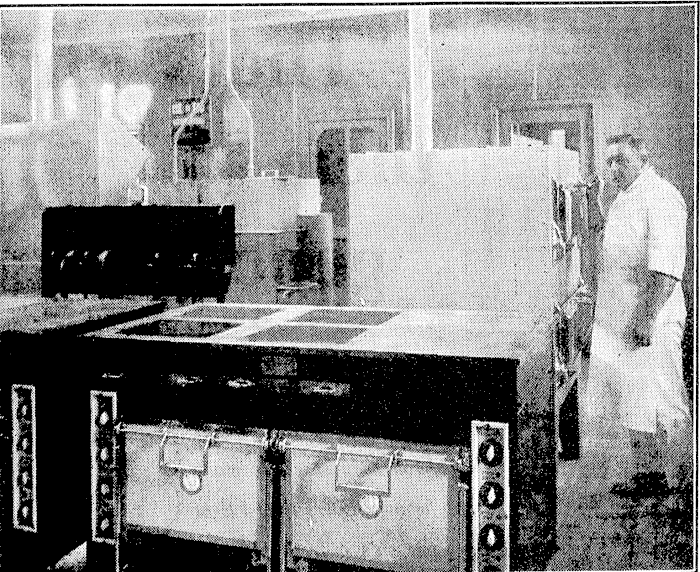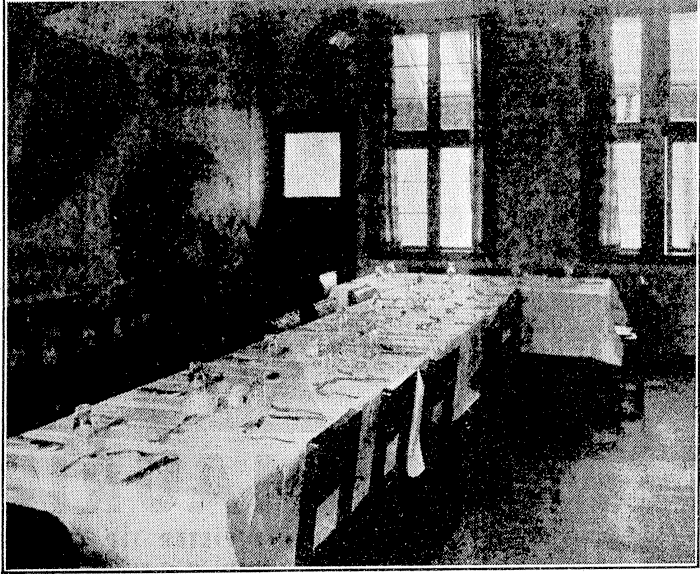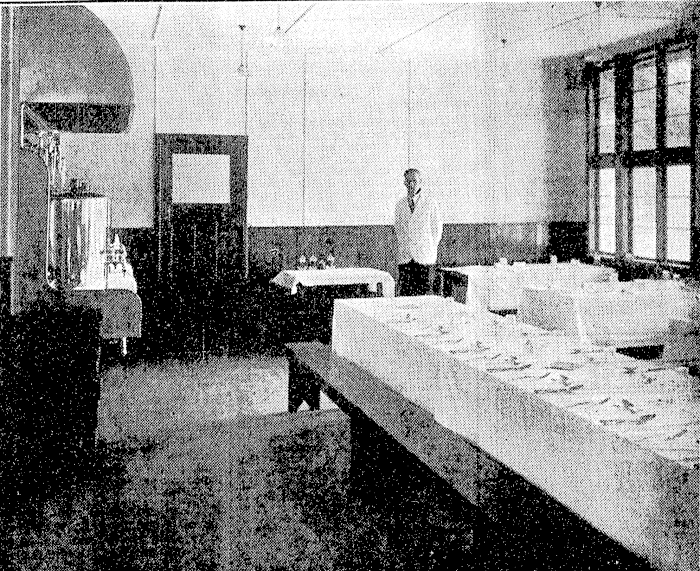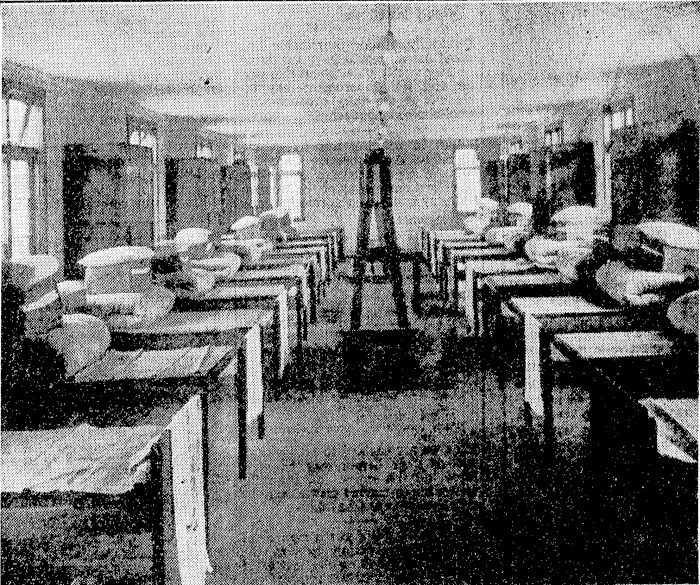Training Young Pilots at North Taieri, 1940
Aug 28, 2024 14:31:52 GMT 12
skyhawkdon and Antonio like this
Post by Dave Homewood on Aug 28, 2024 14:31:52 GMT 12
This article appeared in the Otago Daily Times, on 25 January 1940:
WAR IN THE AIR
TRAINING YOUNG PILOTS
COURSE AT NORTH TAIERI
BUSY BUT ATTRACTIVE LIFE
That their course of training at the Royal New Zealand Air Force Station at North Taieri is hard but enjoyable seems to be the general opinion of the young airman pilots who are to-day leading a particularly busy life, that is completely different from their tasks in peace time. To them, there is still plenty of adventure to be had in modern life, for in the air they are daily having new experiences and new-thrills.
The value of air strength is being stressed to an ever-increasing degree in modern warfare, and these young pilots at North Taieri seem determined to play their part in ensuring that the British Empire is not lacking in fully-trained airmen. With the future kept conveniently in the background, it is an attractive, adventurous life, which the trainees at North Taieri enjoy to the full.
Dawn Patrol to Dark.
The two Squads of trainees have a very full day. Those in A Flight commence their daily syllabus with "dawn patrol". They are served with tea and toast, at the early hour of 5.15, and at 6 take the air for the first flight of the day—"dawn patrol." It is not until 7:45 that they are free to have breakfast. They are in the air again at 10, flying being continued until 12.30, when they lunch. In the afternoon they have a drill period, a lecture, and then recreation. After dinner they usually have another lecture. Lights must be out at 10.30 p.m., but between the lecture and that hour the trainees are expected to do a certain amount of "swot."
Those in B Flight work to a different syllabus. They commence the day with physical training at 6.30, which lasts half an hour. They then have an opportunity to tidy up their, cubicles before breakfast at 7.45. They fly from 8.30 to 10.30, and then have a lecture. After lunch, they take the air again at 12.45 and instruction to different pilots continues until 3.30.They then have another lecture, a short drill period, and recreation, and then after dinner they have another lecture.
Both squads thus have their days fully occupied. It is not all work and no play, however, for the pilots are given plenty of recreation and fairly generous leave.
The First Essential
The chief object .of the training at North Taieri is to make the young men good pilots, and they have the best possible instruction during their total hours' flying. There is a pilot instructor to every three or four trainees, each of whom is given from 10 to 13 hours' dual flying, about 5 hours' blind flying; and the remainder in solo flying.
The chief flying instructor is Flight-lieutenant A. W. Burbidge, who is well known to Dunedin people as the instructor to the Otago Aero Club.
The trainee is first shown on the, ground how the controls on the plane operate, and then he is taken up for his first flight. It depends on his aptitude how many hours of dual flying he requires. Some need only about 10 hours, others; up to 20 hours.
Then comes the solo flying, which includes a cross-country flight of at least 100 miles with a landing at a strange aerodrome and a test in map reading. In this test they are given several points to find and they have to locate them and make a reconnaissance report.
They are given a certain amount of aerobatic experience; but blind-flying is regarded as more important in training for a war in which a lot of the flying will be done at night or in heavy cloud.
"A Very Bright Lot"
The pilot is also taught a great deal about his plane, and its care. Each pilot is required to pull out his own machine, start it up, and run it to see if everything is in order. He is given instruction in the overhaul and maintenance of the engine and aircraft; and is taught how to picket or tie down his plane in open fields where no hangar accommodation is available.
He is taught three types of landing — a tail down landing for general use, a wheel landing for high winds, and a cross-wind landing for use in a restricted area with a short run into the wind. For the blind flying instruction a canvas hood is drawn over the trainee's head and he has to fly entirely by instruments. It is rather a strain to begin with, and not much blind-flying can be done at a time.
"The trainees are a very bright lot," Flight-lieutenant Burbidge told a Daily Times reporter, "Very few are nervous in the air, and, in fact, I find that those who are a little nervous often best pilots. In many ways, men who have no previous training as a pilot are more easily taught than those who have had a few hours with aero clubs. Air sickness is practically unknown, but there have been one or two cases where a man has had to stop because of continual sickness in the air. On the whole, they are a fine lot of young men and are making good pilots. That, of course, is our chief concern — we teach them how to fly a plane well. More advanced training will be "carried out in the next two courses at Wigram."
But the leading aircraftmen at North Taieri learn a lot more than how to fly. They have numerous lectures on a variety of subjects connected with flying and with the aircraft. They have lectures on engines and airframes, on navigation, on aerodynamics (the theory of flight), on armament, on reconnaissance and report writing, and on airmanship. These lectures entail a good deal of study, for examinations are held before the pilots are allowed to proceed to Wigram. The result is that they carry their books around with them, and between flights and in other portions of the day when their whole-attention is not required they may be seen "swotting" some of the diverse subjects that comprise their syllabus.
Romance in the Air
Despite the amount of learning that is necessary in the training, there is a romantic side to the course. The huge-hangar housing a large number of aircraft is an imposing sight which is enhanced in the cold light of early morning—when the flight of planes is lined up for the "dawn patrol,' as then something of the spirit or the Air Force in France is caught. With the engines ticking over gently in the cool morning air and with the pilots and-their instructors ready for the exhilarating flight over a waking countryside, it is a sight that must inspire the young pilots. Man's conquest of the air cannot help but catch the imagination; and this, coupled with the sense of duty in the hour of the country's need, makes the life for the trainees at North Taieri a romantic and inspiring one.
Every care is taken to see that the planes are in first-class order before they take the air. There is a daily check by the engineers and the n.c.o.'s in charge of the engineers, and then, at special intervals; the aircraft are given a thorough and complete check.
Recreation Not Forgotten
Busy as the life is at North Taieri, recreation and sport are not forgotten. A sports officer, Lieutenant W. N. Wood; of the King's High School staff, has been appointed to the station as station education officer and sports officer, and under his direction organised sport will be held. A new swimming pool has been constructed at the station, and tennis courts, cricket pitches, and a running track are being made. On Wednesday afternoons organised games are held; and all the men are expected to take part in them. Indoor games are given every encouragement, and there is even a billiard table.
A fair amount of leave is accorded the men on the station. They have a free picture entertainment at Mosgiel every Wednesday night, and they are given leave on Friday, Saturday, and Sunday nights, with all Sunday free. Discipline is naturally strict in the youngest service, but the authorities certainly believe in the old saying that all work and no play makes Jack a dull boy. Perhaps their reward is to be found in the small number of " dull boys " they have on the station.
The Mess Arrangements
One important feature of any establishment like the Air Force Station is the' mess arrangements. At North Taieri, the mess for officers and men is voted as being more than satisfactory, and no complaint is to be found with the meals. The sergeant cook is an ex-chef from the Awatea and from a leading Christchurch hotel, arid he has three other cooks and the most modern equipment to help him provide remarkably good meals. In fact, the meals are considered by the men to be well above the average restaurant standard.
For breakfast, they are given a choice of fruit and cereals, followed by eggs and bacon or cooked meat and toast, and tea. Lunch usually comprises soup, cold meat and salad, scones, buns and tea. The men have dinner at night, and this is a first-class, three-course meal. Everything is excellently cooked by the latest methods and a feature of the mess is the cleanliness.
In every way, there is not much fault to be found with the life at the North Taieri station. It is a man's life, and the young trainees enjoy it. More and more men are, of course, required for the Royal New Zealand Air Force, but when they are as well treated as they are at the various stations, and when they have the additional incentive that they are doing their duty for their country, it seems unlikely that the required number will not be forthcoming.
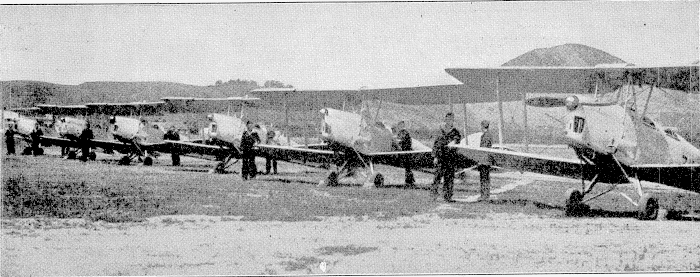
SOME OF THE TIGER MOTHS OF B FLIGHT LINED UP ON THE TARMAC AT THE ROYAL NEW ZEALAND AIR FORCE STATION AT NORTH TAIERI.
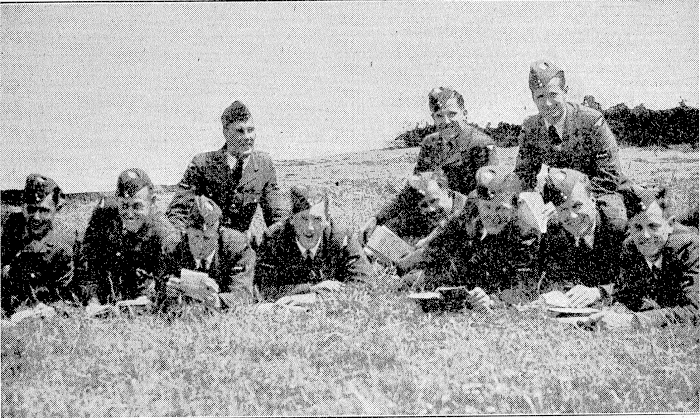
A HAPPY GROUP OF TRAINEES STUDYING THE THEORETICAL SIDE OF THEIR COURSE WHILE AWAITING THEIR TURN TO GO UP.
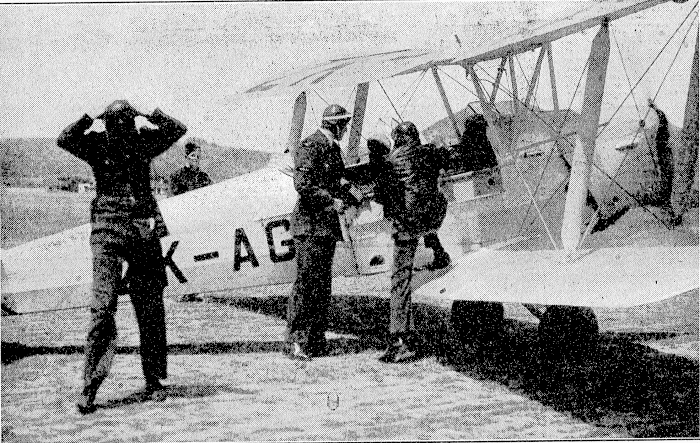
CHANGING PUPILS: THE TRAINEE ON THE LEFT IS WALKING OFF THE TARMAC WHILE THE INSTRUCTOR (IN LEATHER COAT) HAS A FEW WORDS WITH ANOTHER PUPIL BEFORE TAKING OFF.
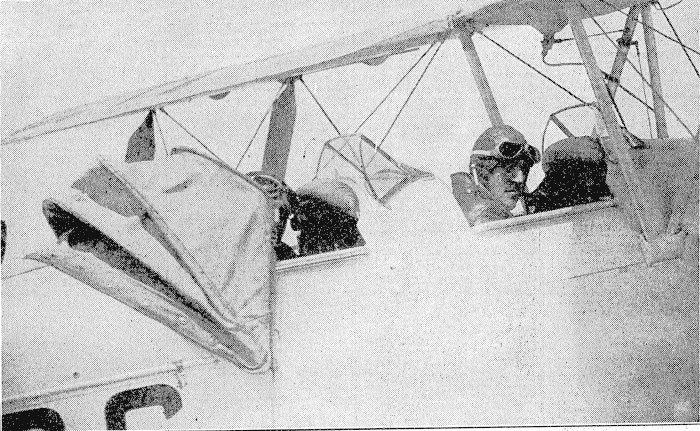
BLIND FLYING INSTRUCTION: THE PUPIL PILOT (IN THE REAR COCKPIT) IS ABOUT TO PULL OVER THE COCKPIT THE HOOD WHICH COMPLETELY SHUTS OUT HIS VISION.
WAR IN THE AIR
TRAINING YOUNG PILOTS
COURSE AT NORTH TAIERI
BUSY BUT ATTRACTIVE LIFE
That their course of training at the Royal New Zealand Air Force Station at North Taieri is hard but enjoyable seems to be the general opinion of the young airman pilots who are to-day leading a particularly busy life, that is completely different from their tasks in peace time. To them, there is still plenty of adventure to be had in modern life, for in the air they are daily having new experiences and new-thrills.
The value of air strength is being stressed to an ever-increasing degree in modern warfare, and these young pilots at North Taieri seem determined to play their part in ensuring that the British Empire is not lacking in fully-trained airmen. With the future kept conveniently in the background, it is an attractive, adventurous life, which the trainees at North Taieri enjoy to the full.
Dawn Patrol to Dark.
The two Squads of trainees have a very full day. Those in A Flight commence their daily syllabus with "dawn patrol". They are served with tea and toast, at the early hour of 5.15, and at 6 take the air for the first flight of the day—"dawn patrol." It is not until 7:45 that they are free to have breakfast. They are in the air again at 10, flying being continued until 12.30, when they lunch. In the afternoon they have a drill period, a lecture, and then recreation. After dinner they usually have another lecture. Lights must be out at 10.30 p.m., but between the lecture and that hour the trainees are expected to do a certain amount of "swot."
Those in B Flight work to a different syllabus. They commence the day with physical training at 6.30, which lasts half an hour. They then have an opportunity to tidy up their, cubicles before breakfast at 7.45. They fly from 8.30 to 10.30, and then have a lecture. After lunch, they take the air again at 12.45 and instruction to different pilots continues until 3.30.They then have another lecture, a short drill period, and recreation, and then after dinner they have another lecture.
Both squads thus have their days fully occupied. It is not all work and no play, however, for the pilots are given plenty of recreation and fairly generous leave.
The First Essential
The chief object .of the training at North Taieri is to make the young men good pilots, and they have the best possible instruction during their total hours' flying. There is a pilot instructor to every three or four trainees, each of whom is given from 10 to 13 hours' dual flying, about 5 hours' blind flying; and the remainder in solo flying.
The chief flying instructor is Flight-lieutenant A. W. Burbidge, who is well known to Dunedin people as the instructor to the Otago Aero Club.
The trainee is first shown on the, ground how the controls on the plane operate, and then he is taken up for his first flight. It depends on his aptitude how many hours of dual flying he requires. Some need only about 10 hours, others; up to 20 hours.
Then comes the solo flying, which includes a cross-country flight of at least 100 miles with a landing at a strange aerodrome and a test in map reading. In this test they are given several points to find and they have to locate them and make a reconnaissance report.
They are given a certain amount of aerobatic experience; but blind-flying is regarded as more important in training for a war in which a lot of the flying will be done at night or in heavy cloud.
"A Very Bright Lot"
The pilot is also taught a great deal about his plane, and its care. Each pilot is required to pull out his own machine, start it up, and run it to see if everything is in order. He is given instruction in the overhaul and maintenance of the engine and aircraft; and is taught how to picket or tie down his plane in open fields where no hangar accommodation is available.
He is taught three types of landing — a tail down landing for general use, a wheel landing for high winds, and a cross-wind landing for use in a restricted area with a short run into the wind. For the blind flying instruction a canvas hood is drawn over the trainee's head and he has to fly entirely by instruments. It is rather a strain to begin with, and not much blind-flying can be done at a time.
"The trainees are a very bright lot," Flight-lieutenant Burbidge told a Daily Times reporter, "Very few are nervous in the air, and, in fact, I find that those who are a little nervous often best pilots. In many ways, men who have no previous training as a pilot are more easily taught than those who have had a few hours with aero clubs. Air sickness is practically unknown, but there have been one or two cases where a man has had to stop because of continual sickness in the air. On the whole, they are a fine lot of young men and are making good pilots. That, of course, is our chief concern — we teach them how to fly a plane well. More advanced training will be "carried out in the next two courses at Wigram."
But the leading aircraftmen at North Taieri learn a lot more than how to fly. They have numerous lectures on a variety of subjects connected with flying and with the aircraft. They have lectures on engines and airframes, on navigation, on aerodynamics (the theory of flight), on armament, on reconnaissance and report writing, and on airmanship. These lectures entail a good deal of study, for examinations are held before the pilots are allowed to proceed to Wigram. The result is that they carry their books around with them, and between flights and in other portions of the day when their whole-attention is not required they may be seen "swotting" some of the diverse subjects that comprise their syllabus.
Romance in the Air
Despite the amount of learning that is necessary in the training, there is a romantic side to the course. The huge-hangar housing a large number of aircraft is an imposing sight which is enhanced in the cold light of early morning—when the flight of planes is lined up for the "dawn patrol,' as then something of the spirit or the Air Force in France is caught. With the engines ticking over gently in the cool morning air and with the pilots and-their instructors ready for the exhilarating flight over a waking countryside, it is a sight that must inspire the young pilots. Man's conquest of the air cannot help but catch the imagination; and this, coupled with the sense of duty in the hour of the country's need, makes the life for the trainees at North Taieri a romantic and inspiring one.
Every care is taken to see that the planes are in first-class order before they take the air. There is a daily check by the engineers and the n.c.o.'s in charge of the engineers, and then, at special intervals; the aircraft are given a thorough and complete check.
Recreation Not Forgotten
Busy as the life is at North Taieri, recreation and sport are not forgotten. A sports officer, Lieutenant W. N. Wood; of the King's High School staff, has been appointed to the station as station education officer and sports officer, and under his direction organised sport will be held. A new swimming pool has been constructed at the station, and tennis courts, cricket pitches, and a running track are being made. On Wednesday afternoons organised games are held; and all the men are expected to take part in them. Indoor games are given every encouragement, and there is even a billiard table.
A fair amount of leave is accorded the men on the station. They have a free picture entertainment at Mosgiel every Wednesday night, and they are given leave on Friday, Saturday, and Sunday nights, with all Sunday free. Discipline is naturally strict in the youngest service, but the authorities certainly believe in the old saying that all work and no play makes Jack a dull boy. Perhaps their reward is to be found in the small number of " dull boys " they have on the station.
The Mess Arrangements
One important feature of any establishment like the Air Force Station is the' mess arrangements. At North Taieri, the mess for officers and men is voted as being more than satisfactory, and no complaint is to be found with the meals. The sergeant cook is an ex-chef from the Awatea and from a leading Christchurch hotel, arid he has three other cooks and the most modern equipment to help him provide remarkably good meals. In fact, the meals are considered by the men to be well above the average restaurant standard.
For breakfast, they are given a choice of fruit and cereals, followed by eggs and bacon or cooked meat and toast, and tea. Lunch usually comprises soup, cold meat and salad, scones, buns and tea. The men have dinner at night, and this is a first-class, three-course meal. Everything is excellently cooked by the latest methods and a feature of the mess is the cleanliness.
In every way, there is not much fault to be found with the life at the North Taieri station. It is a man's life, and the young trainees enjoy it. More and more men are, of course, required for the Royal New Zealand Air Force, but when they are as well treated as they are at the various stations, and when they have the additional incentive that they are doing their duty for their country, it seems unlikely that the required number will not be forthcoming.

SOME OF THE TIGER MOTHS OF B FLIGHT LINED UP ON THE TARMAC AT THE ROYAL NEW ZEALAND AIR FORCE STATION AT NORTH TAIERI.

A HAPPY GROUP OF TRAINEES STUDYING THE THEORETICAL SIDE OF THEIR COURSE WHILE AWAITING THEIR TURN TO GO UP.

CHANGING PUPILS: THE TRAINEE ON THE LEFT IS WALKING OFF THE TARMAC WHILE THE INSTRUCTOR (IN LEATHER COAT) HAS A FEW WORDS WITH ANOTHER PUPIL BEFORE TAKING OFF.

BLIND FLYING INSTRUCTION: THE PUPIL PILOT (IN THE REAR COCKPIT) IS ABOUT TO PULL OVER THE COCKPIT THE HOOD WHICH COMPLETELY SHUTS OUT HIS VISION.






